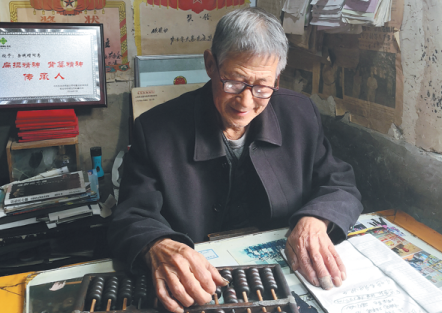Grocer carries village's hopes on his back
By Sun Ruisheng in Pingshun, Shanxi Province | China Daily | Updated: 2019-11-21 10:09

To many tourists seeking tranquillity in Yuejiazhai, Shanxi province, the mountain village's only grocery store probably looks more like a small antique shop.
Located in Pingshun county, the roadside stall is managed by 75-year-old Yue Wanzeng. It has remained unchanged since 1975, when the villagers volunteered to build the little flagstone store for Yue, who has run it ever since.
Outdated enamel cups and thermos flasks are placed on the shelves along with daily necessities such as toothpaste, and portraits of late leaders Mao Zedong and Zhou Enlai hang on blackened walls. Yue calculates the bills on an abacus.
As the only villager in Yuejiazhai who finished junior middle school in the early 1960s, Yue had more opportunities than others to pursue a better life. Instead, he accepted the recommendation of the residents' cooperative that he became the only shop operator for the village, which in 1970 comprised about 20 households.
The grocery store, technically "a purchasing and selling point" affiliated to the cooperative of the county, was built near Yue's home where he had previously traded goods.
His responsibility back then was to buy agricultural produce from the villagers and carrying the goods on a shoulder pole to the nearest town, Shicheng, 17 kilometers away. There he sold the produce to the government-run supply and marketing cooperative's branch in the town and bought daily necessities for the villagers.
It took eight to nine hours for Yue, carrying about 30 to 40 kilograms of goods on his shoulders, to walk the bumpy mountain path connecting his village to the outside world.
Since he was paid a monthly wage, which equates to about 2,000 yuan ($285) today, by the cooperative - a privilege in the planned economy - Yue did not have to work the poor mountain soil like other villagers.
He was not permitted to change the price of the goods to make personal profit, a rule he said he has followed for 45 years as he believes its immoral to take advantage of poor farmers.
Changing times
The villagers' ancestors settled in a remote area in the heart of the Taihang Mountain Range after they fled a coup in East China in the late Song Dynasty (907-1279).
With its secluded location, Yuejiazhai has historically been a place that's been hard to get to for outsiders. Yue's four decades of working as a trader, could just as easily be described as "porter" as he shuttled between the village and town every three days on average.
That changed in 2009 when an asphalt road to the village was finished, opening up Yuejiazhai to tourists and making it easier for villagers to travel.
But for many, the road came too late.
As the market economy replaced the planned economy in the 1980s and 1990s, the village population was quickly hollowed out as young people moved to nearby counties and cities. By 2005, when Yue reached the retirement age of 60, only seven families with elderly members were left in the village.
Although most of his supplies are brought by road nowadays, Yue is worried that if he retires, it will be difficult for the elderly villagers to buy daily necessities.
"If someone can take my job, I will retire," he said. "If not, I will continue to serve the old villagers, as long as my health permits."
Older, wiser
As more self-driving tourists and backpackers head to the mountains, Yue's grocery store plays an important role, selling millet, pepper, walnuts, eggs, edible fungus and herbal medicines the farmers produce to sell to the visitors in order to raise their incomes.
"The dried pepper is of good quality and only half the retail price in big cities," said a traveler surnamed Li, who came from Taiyuan, the capital of Shanxi. "It is interesting that the old man is using an abacus with his callused hands to calculate the total sum, while I pay him by smartphone."
Zhang Haigen, chair of the villagers' committee, said: "Yue is always ready to help others to the maximum of his ability.
"He never made money from the villagers. Now he only sells local specialties on consignment for the villagers to the tourists, and insists on not increasing the prices for his own benefit," Zhang added.
























